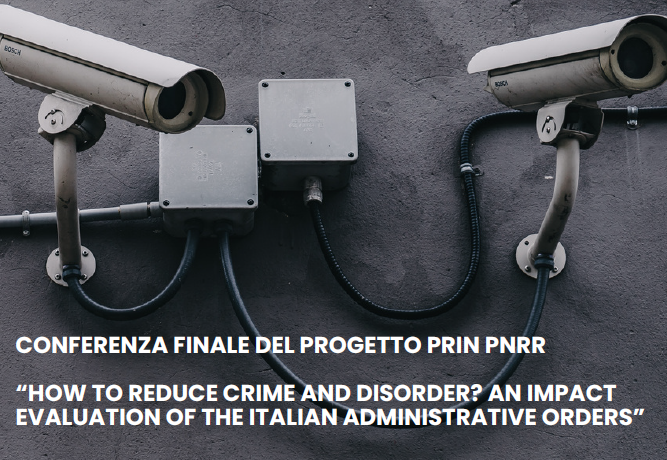Research
Observatory on criminal and security legislation
The Observatory is developing a continuously updated database to track the numbers, types, content, and overall scope of punitive legislative acts passed by the Italian legislature. Additionally, it aims to publish an annual report on the evolution of criminal and security legislation in Italy.
DETAILThe Use of Force and Its Limits in the Penitentiary Context
The research, funded through PSR grants by the University of Milan, aims to explore the challenges surrounding the use of force in the prison system by gathering the experiences and perspectives of prison staff.
DETAILThe Determinants of Urban Security Policies
The project aims to identify the reasons behind the rise of increasingly punitive security policies over the past thirty years. Specifically, it empirically examines bottom-up models (policies as a response to citizen demands) and top-down models (policies as a tool used by elites to shape public opinion) to determine which is more explanatory of the Italian context.
DETAILPolice and Youth with Migrant Backgrounds in the San Siro District of Milan
The study investigates the relationship between young people with a migrant background and the police through a mixed-method research approach in the San Siro district of Milan.
DETAILLatest news
Authoritarianisms in Democracy
Casa della Cultura – Via Borgogna 3, MilanThe Governance of Security at a Crossroads. New Actors, Policy Tools and Emerging Challenges for Policy-Making
Aula Piras – University of Sassari, Viale Mancini 5, SassariFrom Crisis to Resilience: Understanding Youth Violence in the Post-Pandemic Era
Main hall – Regione Emilia-Romagna, Viale Aldo Moro 30, BolognaSelective mechanism: the criminal justice treatment of drug offenses. The case of Rio de Janeiro
The research report Engrenagem seletiva: o tratamento penal dos crimes de drogas. O caso do Rio de Janeiro (Selective Mechanism: The Criminal Justice Treatment of Drug-Related Offenses . The Case of Rio de Janeiro) presents the findings of an original study on the application of the Drug Law in the State of Rio de Janeiro (Law No. 11,343/2006). The analysis was based on 2,567 first-instance court cases with final judgments, adjudicated between 2022 and 2023, and demonstrates how selectivity is particularly pronounced in the enforcement of the Drug Law.
Beyond the barriers: Analyzing implementation, consequences, and coping mechanisms of collective punishment in Palestine
The article analyzes the impact of collective punishments imposed by Israel on Palestinians, highlighting psychological trauma, social fragmentation, and economic hardship, as well as the resilience of communities through solidarity and cultural and practical adaptation strategies.
Individual and contextual factors leading to engagement with paramilitary republican groups
The article examines, through 53 interviews, the social and personal factors that motivate some individuals in Northern Ireland to join republican paramilitary groups. By integrating different criminological theories, the author shows how historical injustices, economic marginalization and individual vulnerabilities intersect to facilitate recruitment.
Comments&Opinions
The case of the ‘Weekend Snipers’ in Sarajevo and violence as a consumable practice
Reflecting on the Commodification of Violence: The Case of the ‘Weekend Snipers’.
Violence and security in the favelas of Rio De Janeiro: between failed policies and “bare life”
In Rio de Janeiro, a comprehensive reform of public security and law enforcement is urgently required, one that enables authorities to operate without resorting to militarized strategies, which, as demonstrated over the years, have consistently proven ineffective for both the safety of police officers and the civilian population of the favelas. Drawing on an analysis of the large-scale police operation carried out on October 28, 2025, in the Latin American metropolis, this article aims to offer a critical reflection on intervention strategies in areas controlled by armed groups, highlighting their limitations, social impacts, and the need for structural reform.
Twenty-Five Years On: The European Society of Criminology at a Crossroads Between Past and Future
From 3 to 6 September 2023, the 25th Conference of the European Society of Criminology took place in Athens, bringing together over 2,300 participants. While it was expected to be a celebration of the Society’s twenty-fifth anniversary, it was instead marked by dissatisfaction and tension, prompting deeper questions about the association’s representativeness, its democratic standards, and its ability to renew itself by giving voice to the new generations of criminologists.
Preventing Violence Against Women Between Compulsory Health Assessments and Public Shaming
The two central components of the Italian Bill 1517 reveal a profound sense of collective disorientation in the face of male violence against women. The legislative response appears to be an expressive and performative one, oscillating between preventive medical punishment and public shaming—offering little room for the layered, nuanced approaches that this deeply sensitive area of intervention requires.









